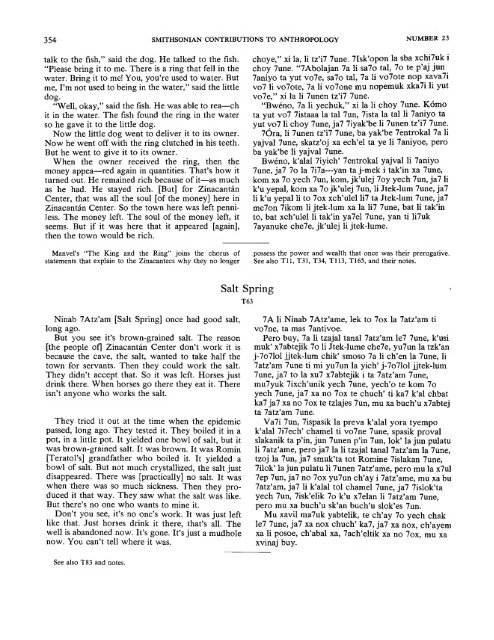PDF (Lo-Res) - Smithsonian Institution Libraries
PDF (Lo-Res) - Smithsonian Institution Libraries
PDF (Lo-Res) - Smithsonian Institution Libraries
Create successful ePaper yourself
Turn your PDF publications into a flip-book with our unique Google optimized e-Paper software.
354 SMITHSONIAN CONTRIBUTIONS TO ANTHROPOLOGY NUMBER 23<br />
talk to the fish," said the dog. He talked to the fish.<br />
"Please bring it to me. There is a ring that fell in the<br />
water. Bring it to me! You, you're used to water. But<br />
me, I'm not used to being in the water," said the little<br />
dog.<br />
"Well, okay," said the fish. He was able to rea—ch<br />
it in the water. The fish found the ring in the water<br />
so he gave it to the little dog.<br />
Now the little dog went to deliver it to its owner.<br />
Now he went off with the ring clutched in his teeth.<br />
But he went to give it to its owner.<br />
When the owner received the ring, then the<br />
money appea—red again in quantities. That's how it<br />
turned out. He remained rich because of it—as much<br />
as he had. He stayed rich. [But] for Zinacantan<br />
Center, that was all the soul [of the money] here in<br />
Zinacantan Center. So the town here was left penniless.<br />
The money left. The soul of the money left, it<br />
seems. But if it was here that it appeared [again],<br />
then the town would be rich.<br />
Manvel's "The King and the Ring" joins the chorus of<br />
statements that explain to the Zinacantecs why they no longer<br />
Ninab 7Atz'am [Salt Spring] once had good salt,<br />
long ago.<br />
But you see it's brown-grained salt. The reason<br />
[the people of] Zinacantan Center don't work it is<br />
because the cave, the salt, wanted to take half the<br />
town for servants. Then they could work the salt.<br />
They didn't accept that. So it was left. Horses just<br />
drink there. When horses go there they eat it. There<br />
isn't anyone who works the salt.<br />
They tried it out at the time when the epidemic<br />
passed, long ago. They tested it. They boiled it in a<br />
pot, in a little pot. It yielded one bowl of salt, but it<br />
was brown-grained salt. It was brown. It was Romin<br />
[Teratol's] grandfather who boiled it. It yielded a<br />
bowl of salt. But not much crystallized, the salt just<br />
disappeared. There was [practically] no salt. It was<br />
when there was so much sickness. Then they produced<br />
it that way. They saw what the salt was like.<br />
But there's no one who wants to mine it.<br />
Don't you see, it's no one's work. It was just left<br />
like that. Just horses drink it there, that's all. The<br />
well is abandoned now. It's gone. It's just a mudhole<br />
now. You can't tell where it was.<br />
See also T83 and notes.<br />
Salt Spring<br />
T63<br />
choye," xi la, li tz'i7 7une. 7Isk'opon la sba xchi7uk i<br />
choy 7une. "7Abolajan 7a li sa7o tal, 7o te p'aj jun<br />
7aniyo ta yut vo7e, sa7o tal, 7a li vo7ote nop xava7i<br />
vo7 li vo7ote, 7a li vo7one mu nopemuk xka7i li yut<br />
vo7e," xi la li 7unen tz'i7 7une.<br />
"Bweno, 7a li yechuk," xi la li choy 7une. Komo<br />
ta yut vo7 7istaaa la tal 7un, 7ista la tal li 7aniyo ta<br />
yut yo7 li choy 7une, ja7 7iyak'be li 7unen tz'i7 7une.<br />
7Ora, li 7unen tz'i7 7une, ba yak'be 7entrokal 7a li<br />
yajval 7une, skatz'oj xa ech'el ta ye li 7aniyoe, pero<br />
ba yak'be li yajval 7une.<br />
Bweno, k'alal 7iyich' 7entrokal yajval li 7aniyo<br />
7une, ja7 7o la 7i7a—yan ta j-mek i tak'in xa 7une,<br />
kom xa 7o yech 7un, kom, jk'ulej 7oy yech 7un, ja7 li<br />
k'u yepal, kom xa 7o jk'ulej 7un, li Jtek-lum 7une, ja7<br />
li k'u yepal li to 7ox xch'ulel 117 ta Jtek-lum 7une, ja7<br />
me7on 7ikom li jtek-lum xa la H7 7une, bat li tak'in<br />
to, bat xch'ulel li tak'in ya7el 7une, yan ti H7uk<br />
7ayanuke che7e, jk'ulej li jtek-lume.<br />
possess the power and wealth that once was their prerogative.<br />
See also Til, T31, T34, T113, T165, and their notes.<br />
7A li Ninab 7Atz'ame, lek to 7ox la 7atz'am ti<br />
vo7ne, ta mas 7antivoe.<br />
Pero buy, 7a li tzajal tanal 7atz'am Ie7 7une, k'usi<br />
muk' x7abtejik 7o li Jtek-lume che7e, yu7un la tzk'an<br />
j-7o71ol jjtek-lum chik' smoso 7a li chen la 7une, li<br />
7atz'am 7une ti mi yu7un la yich' j-7o71ol jjtek-lum<br />
7une, ja7 to la xu7 x7abtejik i ta 7atz'am 7une,<br />
mu7yuk 7ixch'unik yech 7une, yech'o te kom 7o<br />
yech 7une, ja7 xa no 7ox te chuch' ti ka7 k'al chbat<br />
ka7 ja7 xa no 7ox te tzlajes 7un, mu xa buch'u x7abtej<br />
ta 7atz'am 7une.<br />
Va7i 7un, 7ispasik la preva k'alal yora tyempo<br />
k'alal 7i7ech' chamel ti vo7ne 7une, spasik proval<br />
slakanik ta p'in, jun 7unen p'in 7un, lok' la jun pulatu<br />
li 7atz'ame, pero ja7 la li tzajal tanal 7atz'am la 7une,<br />
tzoj la 7un, ja7 smuk'ta tot Romine 7islakan 7une,<br />
7ilok' la jun pulatu li 7unen 7atz'ame, pero mu la x7ul<br />
7ep 7un, ja7 no 7ox yu7un ch'ay i 7atz'ame, mu xa bu<br />
7atz'am, ja7 li k'alal tol chamel 7une, ja7 7islok'ta<br />
yech 7un, 7isk'elik 7o k'u x7elan li 7atz'am 7une,<br />
pero mu xa buch'u sk'an buch'u slok'es 7un.<br />
Mu xavil ma7uk yabtelik, te ch'ay 7o yech chak<br />
Ie7 7une, ja7 xa nox chuch' ka7, ja7 xa nox, ch'ayem<br />
xa li posoe, ch'abal xa, 7ach'eltik xa no 7ox, mu xa<br />
xvinaj buy.

















